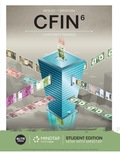
To critically think about: The reason why the stockholders’ of Company F would not suffer a loss despite the loss reported in the income statement
Introduction:
The income statement indicates the performance of an organization for a short period. The net income of the company will be positive if the net revenues exceed its expenses. It indicates profit for the financial period. The net income will be negative if the expenses exceed the revenues. It indicates a loss for the financial period.
Write offs refer to the
Cash flow refers to the difference between the money that actually flows in and out of the company. Cash flow ignores noncash items like depreciation. Depreciation is just an accounting value, and the depreciation expenses do not lead to any
Want to see the full answer?
Check out a sample textbook solution
Chapter 2 Solutions
CORPORATE FINANCE(LL)
- Some in the financial press were critical of seagram’s management for selling Du Pont stock for below current market price. Specifically, commentators said that Seagram;s management sold the Du pont stock at $4.50 per share less than market value, which damaged the wealth of seagram shareholders. Do you agree? Why or why not?arrow_forwardExplain in full detail why the following statement is false: "Financial managers should not focus on the present stock value of the company. Instead, they should focus on the profitability of the company. Doing so will result in increasing the value of the stock.arrow_forwardp12 According to the pecking order theory, managers are less likely to use which of the following sources of financing? Retained earnings New preferred stock New common stock New debtarrow_forward
- Hi Expert,I got this theoretical question in Corporate Finance, and i was hoping for a bit of help :)What is the relationship between the expected return of a stock and its fair expected return? When is a stock underpriced, overpriced, or fairly priced?Best,Christianarrow_forwardAccording to the critics of stock price maximisation, “A practical problem with stock price as a performance measure is that it depends on a whole array of factors outside the company’s control. One can never be certain whether an increase in stock price reflects improving company performance or other environmental factors” (Higgins, Koski & Mitton, 2022, p. 60) In not more than 200 words, discuss the above quotation using GameStop Debacle as a case study.arrow_forwardIf you are in financial hardship, explain what it means. If we suppose that financial hardship occurs, explain how and why financial distress would make a company's stock more hazardous.arrow_forward
- What is the value of Ls stock for volatilities between 0.20 and 0.95? What incentives might the manager of L have if she understands this relationship? What might debtholders do in response?arrow_forwardWhy might a company repurchase its own stock? A) It believes that the market undervalues its shares B) To offset dilutive effects of employee stock options granted C) To recognize an economic gain when the treasury shares are later sold for a profit D) To improve earnings per share by reducing the denominator E) All of the above is it just A and B or is it all of the abovearrow_forward04-Balance sheet is known to be one of the very popular financial statement of the company that shows the total worth of the business. Now sometimes it puts a very positive impact on investor's mind. Sometimes it leaves a question in the investor's mind regarding its fair value. One of the significant criticism is a. It can be attached to some other phenomenon in the settings b. There is no difference between Fair value and historical value c. None of the options d. It is easy to be manipulated and considered as soft measurearrow_forward
- According to the textbook: Return on Equity (ROE) is a measure of how the stockholders fared during the year. Because benefiting shareholders is our goal, ROE is, in an accounting sense, the true bottom-line measure of performance. Breaking ROE into its constituent parts, by using the DuPont identity, identifies a firm’s operating efficiency, asset use, and financial leverage. However, these measures rely upon accounting data that may or may not be useful. Why would a firm have a negative ROE? Should investors buy stocks that have negative ROEs? What do you see as an alternative measure of how a firm benefits its shareholders?arrow_forwardQ41 Which one of the following is not an assumption of the Walter’s relevance theory model? a. Earnings and Dividends are do not change while determining the value b. The firm finances through external sources c. The firm has infinite life d. The firm’s rate of return and its cost of capital are constantarrow_forwardGive typing answer with explanation and conclusion Which of the following represent undiversifiable risks? I. The Federal Reserve raises interest rates. II. A product is recalled because of safety problems. III. The economy slips into a recession. IV. The CEO 's divorce settlement forces him to sell off half of his stock holdings.arrow_forward
 EBK CONTEMPORARY FINANCIAL MANAGEMENTFinanceISBN:9781337514835Author:MOYERPublisher:CENGAGE LEARNING - CONSIGNMENT
EBK CONTEMPORARY FINANCIAL MANAGEMENTFinanceISBN:9781337514835Author:MOYERPublisher:CENGAGE LEARNING - CONSIGNMENT
 Intermediate Financial Management (MindTap Course...FinanceISBN:9781337395083Author:Eugene F. Brigham, Phillip R. DavesPublisher:Cengage Learning
Intermediate Financial Management (MindTap Course...FinanceISBN:9781337395083Author:Eugene F. Brigham, Phillip R. DavesPublisher:Cengage Learning- Business/Professional Ethics Directors/Executives...AccountingISBN:9781337485913Author:BROOKSPublisher:Cengage
 Managerial AccountingAccountingISBN:9781337912020Author:Carl Warren, Ph.d. Cma William B. TaylerPublisher:South-Western College Pub
Managerial AccountingAccountingISBN:9781337912020Author:Carl Warren, Ph.d. Cma William B. TaylerPublisher:South-Western College Pub




